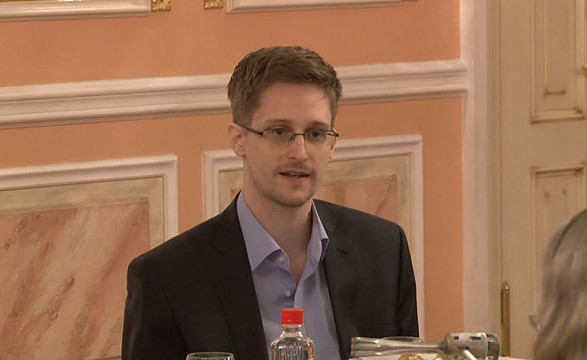On Monday, Judge Bruce Selya spoke at the Watson Institute in an event titled “The View from Inside the FISA Courts.” Selya is a federal appellate judge in Providence, and former presiding judge of the Foreign Intelligence Surveillance Court of Review (FISCR). The FISCR is the place where decisions from the more-famous Foreign Intelligence Surveillance Court (FISC) are appealed. The FISC is the court that authorizes agencies like the NSA to survey foreigners inside the United States. The NSA’s surveillance efforts, which have included bulk collection of phone and Internet data from American citizens, have been in the spotlight after leaks from Edward Snowden.
Judge Selya said the conversation stirred by Snowden’s leaks has been “wonderful,” but Snowden’s actions were “treasonous.” While Snowden certainly broke the law, treason implies he worked to aid America’s enemies, which doesn’t seem true. And while Snowden’s assertion that he took his job with a security contractor specifically to gather evidence about surveillance programs appears nefarious, his actions all point to someone who thought he was a whistleblower. The simple fact is that without Snowden, this “wonderful” conversation doesn’t happen. If we believe this dialogue is important and necessary, this belief must color our view of Snowden and his actions.
Judge Selya expressed confidence in the court system set up by the Foreign Intelligence Surveillance Act (FISA), the judges serving on those courts, and the intelligence professionals who submit surveillance requests. This is understandable from a man who has spent over half a century as a judge. He also did not see the FISA courts as significantly different from other types of courts, and at several points compared FISA proceedings to more familiar judicial proceedings. For example, the judge was asked about the idea that the FISA courts should not just include representatives from the intelligence community, but a public interest advocate to argue the other side (a recommendation given by the president’s own surveillance panel). Judge Selya stated creating an adversarial system for the FISA courts is a “awful” idea, and noted that when traditional law enforcement authorities request permission to conduct surveillance, those proceedings are ex parte, meaning only one side is present.
The judge also noted that there are already checks on surveillance. The Constitution protects the basic rights of American citizens, Congress can choose to use legislation to amend surveillance programs, and the president has the prerogative to limit his own actions. Judge Selya also responded to the criticism that a vast majority of surveillance requests are granted by the court. He pointed out that applications to the FISC are only formally submitted after consultations with judges, so applications are often amended in advance to take into account judges’ concerns. The courts have more oversight than the statistics might suggest.
The judge glosses over some aspects of the FISA courts that do make them unique. As Timothy Edgar of the Watson Institute noted in a question to the judge, traditional law enforcement surveillance has a built-in check because that surveillance can be thrown out at trial if not conducted properly. Edgar also argued that FISA court requests often authorize large-scale programs, rather than other surveillance warrants that are limited. In addition, although Judge Selya contended that the other branches could limit surveillance, he admitted that Congress is gridlocked, and it’s often hard for anyone (even presidents) to dispute the claims of knowledgeable intelligence officials.
One of the issues with domestic surveillance is that it’s hard to see the government at work. Tax increases show up every April, health insurance mandates change your insurance plan, and gun control creates more paperwork. But collection of your cell phone metadata and Internet records is silent, which explains the fact that while polls express concern about the NSA’s actions, there is a lack of deep outrage from most Americans. For a president, the incentive will always be for more surveillance – the risk of a terrorist attack outweighs any griping from the ACLU. This suggests that the courts have an especially important role in protecting the privacy of America from government surveillance. Judge Selya believes that courts are up to the task, but many disagree. The judge argued that some steps could be taken, such as publishing more opinions over FISA courts and conducting annual reviews that would suggest changes to the courts. But is this truly enough?
